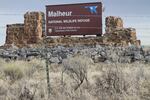
Rob Manning / OPB
Media were allowed into the Malheur National Wildlife Refuge buildings Wednesday for the first time since the occupation ended last month.
The refuge, which was blanketed in snow during the 41-day occupation, shows signs of spring's arrival: birds twitter and chirp and cattle graze in the distance. On the surface, life seems to be moving on. However, there are numerous costs in returning the refuge back to normal.
There's the economic costs: the U.S. Fish and Wildlife Service estimates the occupation's price tag so far to federal tax payers is $5.7 million. That number is expected to increase.
Then there's the cost to environmental projects: workers here say a massive backlog will be difficult to close after missing more than two months at the refuge.
There's also the psychological toll: workers describe leaving their homes in the middle of the night when the occupation began, only to return to a divided community in Burns. And it's that cost to the community's social fabric that is hardest to quantify — and the most difficult to pay.
Despite everything, there seems to be considerable progress being made at restoring the refuge to its pre-occupation condition. A spokesperson for the Fish and Wildlife Service expects it to be fully open within the next four weeks.
OPB reporter John Sepulvado, who was at the refuge for Wednesday's tour, spoke with All Things Considered host Kate Davidson about what he saw. Listen to their full conversation by clicking play in the audio player at the top of the article.

